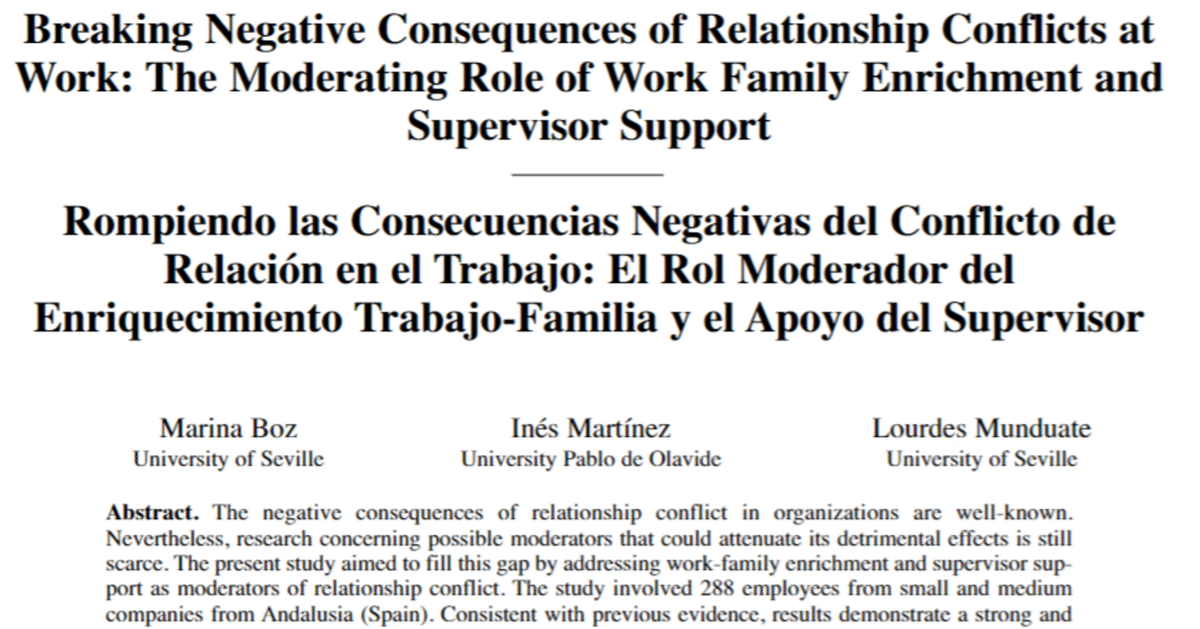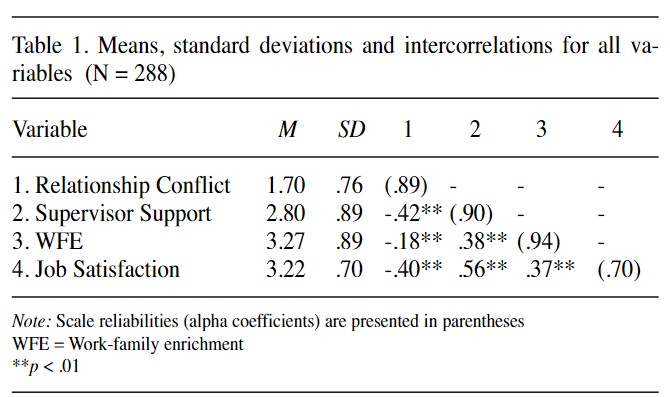
【上司のサポートと職場エンリッチメントは関係性の対立による職場満足度の低下を緩和する】Breaking negative consequences on relationship conflicts at work: the moderating role of work family enrichment and supervisor support
概要
組織における関係性の対立が及ぼす負の結果はよく知られているが、この有害な結論を緩和するモデレータについてあまり知られていない。本研究では、仕事-家族エンリッチメントと上司のサポートに焦点を当ててモデレート効果を調査した。
スペイン・アンダルシアの中規模から大規模の会社に勤める288名の従業員を対象とした。
その結果、関係性の対立は仕事の満足度に負の影響を及ぼした
しかし、仕事と家族のエンリッチメント及び管理職のサポートはその負の影響を緩和し、上司からサポートを受けているあるいは充実した職場環境があると関係性の対立は職場満足度に影響を及ぼしにくくなった
問題と目的
対立は、関係性の対立と課題の対立に区別される (Jehn, 1995)
関係性の対立は、緊張や対立などの感情などを通じた対人関係の違和感・非互換性の気づきとして定義される
また、個人的な嫌悪感、イライラした感情も含まれる (Jehn & Mannix, 2001)
関係性の対立は、心理社会的な負の影響に加えて、離職する傾向を強める (Medina et al., 2005)
関係性の対立のモデレータ
関係性の対立に関する研究は、対立が生じた際に何をすべきかを明らかにしておらず、モデレーターの探索が必要であると提言している (De Dreu & Van Vianen, 2001; DeDreu & Weingart, 2003)
関係性の対立は急性のストレスとして知られるようになったが、ストレスを緩和するものとして資源があり、それは道具的資源と情緒的資源に分類される
したがって本研究では資源を仕事家庭エンリッチメントと管理職の支援として取り上げることとした
①職場環境
仕事家庭エンリッチメントは、仕事の役割が個人の道具的・感情的資源となり、家庭生活のパフォーマンスを助けているとの知覚である (Greenhaus & Powell, 2006)
仮説1:高い仕事家族エンリッチメントは、関係性の対立が仕事の満足度を抑制する効果を緩和する
②上司のサポート
ソーシャルサポートによるストレスと健康関連アウトカムの関連を緩和効果はよく知られている
支持的な上司は従業員の仕事満足度と組織へのコミットメントを促すことも知られている (Parasuraman, Greenhaus & Granrose ,1992)
仮説2:管理職の支援が強いほど、対人関係の対立が仕事の満足度を抑制する効果は緩和される
方法
手続きと対象者
スペイン・アンダルシアの小規模-中規模の会社の従業員288名 (女性167名、平均年齢35.41歳、既婚者76.2%、子供がいる64.7%、64.1%が大学または専門学校の教育)
測定内容
①関係性の対立 (Cox, 1998)
関係性の対立の中で積極的に敵意が表現されるものを測定する、5項目5件法のリッカート尺度 (alpha=.89)
the atmosphere here is often charged with hostility
backbiting is a frequent occurrence
One party frequently undermines the other
there are often feelings of hostility among parties
much plotting takes place behind the scenes
②仕事家族エンリッチメント (Carlson et al., 2006)
仕事が家族をエンリッチメントする程度を測定する9項目3下位尺度のリッカートスケール (成長、影響、資源の下位尺度、alpha=.94)
③仕事の満足度 (Weiss et al., 1965)
④上司の支援 (Karasek et al., 1985)
従業員が上司の道具的・情緒的サポートを知覚する程度を調べる、4件法のリッカート尺度 (alpha=.90)
⑤統制変数:年齢、性別、既婚、子供の有無、教育歴、就業時間、契約内容、賃金、テニュア
結果

予想どおり
上司のサポート、仕事家族エンリッチメントは関係性の対立を抑制し
関係性の対立は仕事の満足度を抑制
上司のサポートと仕事家族エンリッチメントは仕事満足度を促進

単回帰分析により、関係性の対立は仕事の満足度を抑制した (beta = -.422, p<.001)
次に、階層的重回帰分析の結果、関係性の対立は仕事の満足度を抑制し、仕事家庭エンリッチメントは仕事の満足度を促進することが示された
さらに、関係性の対立*仕事家庭エンリッチメントも統計学的に有意な増分妥当性を示した

Cohen & Cohen (1983) に従い傾斜分析を行った結果、ワークファミリーエンリッチメントが高い方が、関係性の対立が悪化しても仕事の満足度は低下しないが、ワークファミリーエンリッチメントが低いと関係性の対立の悪化にともない仕事の満足度も低下することが示された

階層的重回帰分析の結果、関係性の対立は仕事の満足度を抑制し、上司のサポートは仕事の満足度を強く促すことが示された
また、関係性の対立と上司のサポートのインタラクションタームによる増分妥当性も示された

傾斜分析の結果、上司のサポートが高い従業員の方が、関係性の対立が悪化した際に仕事の満足度が低下しにくく、上司のサポートが低い従業員は関係性の対立が悪化した際に仕事の満足度が低下した
文献
Boz, M., Martínez, I., & Munduate, L. (2009). Breaking negative consequences of relationship conflicts at work: The moderating role of work family enrichment and supervisor support. Revista de Psicología del Trabajo y de las Organizaciones, 25(2), 113-121.
Carlson, D. S., Kacmar, K. M., Wayne, J. H., & Grzywacz, J. G. (2006). Measuring the positive side of the work–family interface: Development and validation of a work–family enrichment scale. Journal of vocational behavior, 68(1), 131-164.
Cohen, J. & Cohen, P. (1983). Applied multiple regression/correlationanalysis for the behavioral sciences. New Jersey: Lawrence Erlbaum.Cohen, S. & Wills, T.A. (1985). Stress, social support, and the buffering hypothesis. Psychological Bulletin, 98, 310-357.
Cox, K. B. (1998). Antecedents and effects of intergroup conflict in the nursing unit. Unpublished doctoral dissertation, Virginia Commonwealth University, Richmond, VA, USA.
De Dreu, C. K., & Van Vianen, A. E. (2001). Managing relationship conflict and the effectiveness of organizational teams. Journal of Organizational Behavior: The International Journal of Industrial, Occupational and Organizational Psychology and Behavior, 22(3), 309-328.
De Dreu, C. K., & Weingart, L. R. (2003). Task versus relationship conflict, team performance, and team member satisfaction: a meta-analysis. Journal of applied Psychology, 88(4), 741.
Jehn, K. A. (1995). A multimethod examination of the benefits and detriments of intragroup conflict. Administrative science quarterly, 256-282.
Jehn, K.A. & Mannix, E. (2001). The dynamic nature of conflict: A longitudinal study of intragroup conflict and group performance. Academy of Management Journal, 44, 238-251.
Karasek, R.A., Gordon G., Pietrokovsky, C., Frese M., Pieper C., Schwartz J., Fry L., & Schirer D. (1985). Job Content Instrument: Questionnaire and User’s Guide. Los Angeles, CA: University of Southern California
Medina, F. J., Munduate, L., Dorado, M. A., Martínez, I., & Guerra, J. M. (2005). Types of intragroup conflict and affective reactions. Journal of managerial psychology, 20(3/4), 219-230.
Parasuraman, S., Greenhaus, J. H., & Granrose, C. S. (1992). Role stressors, social support, and well‐being among two‐career couples. Journal of Organizational behavior, 13(4), 339-356.
Powell, G. N., & Greenhaus, J. H. (2006). Is the opposite of positive negative? Untangling the complex relationship between work‐family enrichment and conflict. Career development international, 11(7), 650-659.
Weiss, D.J., Dawis, R.V., England, G.W., & Lofquist, L.H. (1965). Construct validation studies of the Minnesota importance questionnaire. Minnesota Studies in Vocational Rehabilitation, XVIII.
コメント
関係性の対立は、上司のサポートが強力な緩和剤となる
この記事が気に入ったらサポートをしてみませんか?
